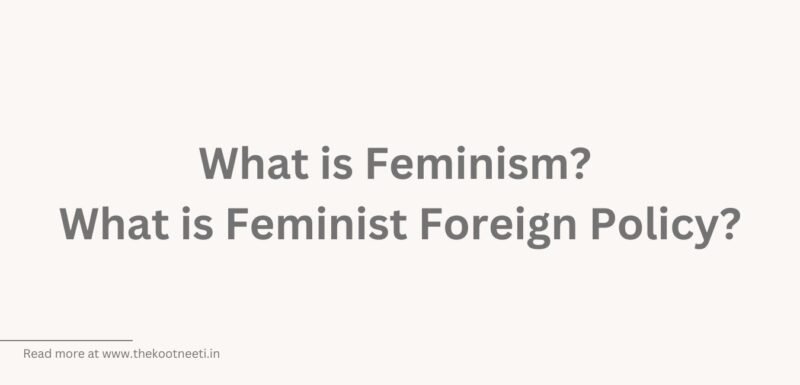What is Feminism? What is Feminist Foreign Policy?

Feminism is a social, political, and ideological movement that seeks to advance the rights and status of women. Feminism is concerned with issues such as gender inequality, discrimination, and violence against women, and it seeks to challenge and change the social, economic, and political systems and practices that perpetuate these issues.
It has a long history, with roots in the women’s suffrage movement and other social and political movements that sought to promote women’s rights. There have been many different waves of feminism, each with its own distinct goals and strategies.
Feminism is a diverse and multifaceted movement, and there are many different strands and approaches within feminism. Some feminists focus on issues such as reproductive rights and access to healthcare, while others focus on issues such as economic equality and employment discrimination.
With a significant impact on social, political, and economic systems and practices around the world, it continues to be an important force for change and equality.
Theory of Feminism
Feminism is a diverse and multifaceted movement, and there are many different theories within feminism that seek to explain and address issues of gender inequality and discrimination. Here are some examples of feminist theories:
- Liberal feminism: Liberal feminism is a theory that focuses on individual rights and equality under the law. It asserts that women should have the same legal rights and opportunities as men, and it seeks to change laws and policies that discriminate against women.
- Socialist feminism: Socialist feminism is a theory that emphasizes the role of economic and class relations in shaping gender inequality. It asserts that the oppression of women is rooted in the capitalist system and that the liberation of women requires the transformation of society as a whole.
- Radical feminism: Radical feminism is a theory that focuses on the role of patriarchy and male domination in shaping gender inequality. It asserts that the oppression of women is inherent to patriarchy and that the liberation of women requires the complete overthrow of patriarchy.
- Intersectionality: Intersectionality is a theory that emphasizes the intersecting and overlapping nature of social identities and systems of oppression, such as race, class, gender, sexuality, and ability. It asserts that these identities and systems of oppression are interconnected and cannot be understood or addressed in isolation.
These are just a few examples of feminist theories, and there are many others as well. Feminism is a diverse and evolving movement, and there is ongoing debate within the movement about the best approaches to addressing issues of gender inequality and discrimination.
Feminist Foreign Policy
Feminist foreign policy is a concept that refers to the integration of a feminist perspective into the development and implementation of foreign policy. It involves the recognition that gender inequality and discrimination are global issues that must be addressed in international relations and that the promotion of women’s rights and gender equality should be a central objective of foreign policy.
It seeks to challenge traditional foreign policy approaches that have often marginalized or ignored the concerns of women and other marginalized groups. It involves the incorporation of a gender perspective into all aspects of foreign policy, including economic policy, security policy, and humanitarian policy.
It has gained increasing recognition in recent years, with a number of countries, including Sweden, Canada, and Mexico, adopting explicit feminist foreign policy frameworks. These frameworks often involve specific goals and targets for promoting gender equality and women’s rights, as well as the integration of a gender perspective into all aspects of foreign policy decision-making.
Feminist foreign policy has the potential to contribute to the promotion of gender equality and women’s rights around the world, as well as to broader goals of peace and stability. However, it has also been the subject of criticism and debate, with some arguing that it may be difficult to effectively implement and that it may conflict with other foreign policy objectives.



















